https://www.philahomeopathy.com/natural-treatment-for-gastritis/
Treatment for gastritis depends on the type of gastritis and its cause. In some cases, such as gastritis that is caused by alcohol or NSAIDs, when these substances are eliminated gastritis may go away on its own. When the cause of gastritis is an infection by the H. pylori bacterium, the gastritis treatment based on antibiotics to destroy the bacterium.
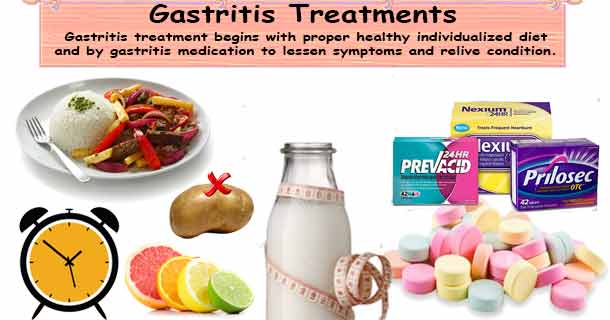
Medications used to treat gastritis include:
- Antibiotic medications to kill H. pylori. For H. pylori in your digestive tract, your doctor may recommend a combination of antibiotics, such as clarithromycin (Biaxin) and amoxicillin (Amoxil, Augmentin, others) or metronidazole (Flagyl), to kill the bacterium. Be sure to take the full antibiotic prescription, usually for seven to 14 days.
- Medications that block acid production and promote healing. Proton pump inhibitors reduce acid by blocking the action of the parts of cells that produce acid. These drugs include the prescription and over-the-counter medications omeprazole (Prilosec), esomeprazole (Nexium), dexlansoprazole (Dexilant), and pantoprazole (Protonix). Long-term use of proton pump inhibitors, particularly at high doses, may increase your risk of hip, wrist, and spine fractures. Ask your doctor whether a calcium supplement may reduce this risk.
- Medications to reduce acid production. Acid blockers also called histamine (H-2) blockers reduce the amount of acid released into your digestive tract, which relieves gastritis pain and encourages healing. Available by prescription or over-the-counter, acid blockers include famotidine (Pepcid), cimetidine (Tagamet HB), and nizatidine (Axid AR).
- Antacids that neutralize stomach acid. Your doctor may include an antacid in your drug regimen. Antacids neutralize existing stomach acid and can provide rapid pain relief. Side effects can include constipation or diarrhea, depending on the main ingredients.
Since medications can cause side effects, most people are looking into natural treatment for gastritis because of its effectiveness and no side effects.
What is gastritis?
Contrary to common belief, gastritis is not a single disease but rather several different conditions. Millions of people around the globe suffer from gastritis and while this is not a life-threatening condition, it can gravely reduce the quality of life one lives. Gastritis can be caused by various factors ranging from infection to diet to surgery. A lot of research has been done into the causes, development, and cures for gastritis. This research has been used to debunk a lot of myths into what causes gastritis and who is especially at risk.
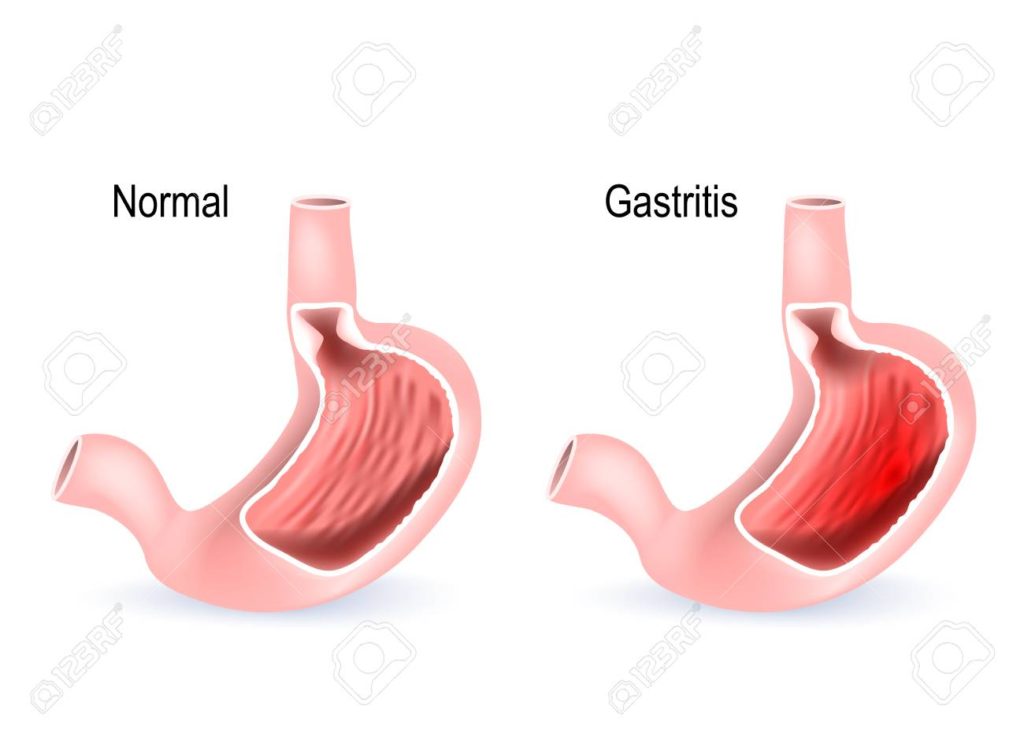
Injury, illness, bacteria, or viruses can cause gastritis with the most prevalent cause worldwide being a bacterium called Helicobacter pylori. This bacterium invades the mucous lining of the duodenum and stomach and can cause peptic ulcers in addition to gastritis. It is one of the few known bacteria that can survive the stomach’s very acidic environment; most other organisms are destroyed. Luckily, it is possible to have the Helicobacter pylori bacterium in your stomach and never see any symptoms.
You can also develop gastritis due to a breakdown of the immune system. If you’ve had a prolonged illness, or if you are on immunosuppressant drugs for cancer treatment or have HIV, this can weaken your immune system and make you more susceptible to developing gastritis.
One type of gastritis is more specifically known as erosive gastritis. This is where the stomach isn’t just inflamed but is being worn away. The stomach lining can be eroded by a variety of irritants, including aspirin. Crohn’s disease can wear the stomach lining away, too. Typically, a person with erosive gastritis doesn’t know he has it at first because it generally develops very slowly over time. Often, the person is otherwise quite healthy and shows no symptoms until finally, erosive gastritis becomes severe enough to be noticeable.
Causes of gastritis
Gastritis may be caused by many things. It can be caused by diet and lifestyle habits such as:
- Drinking too much alcohol
- Eating spicy foods
- Smoking
- Extreme stress. This can be from serious or life-threatening health problems.
- Long-term use of aspirin and over-the-counter pain and fever medicines
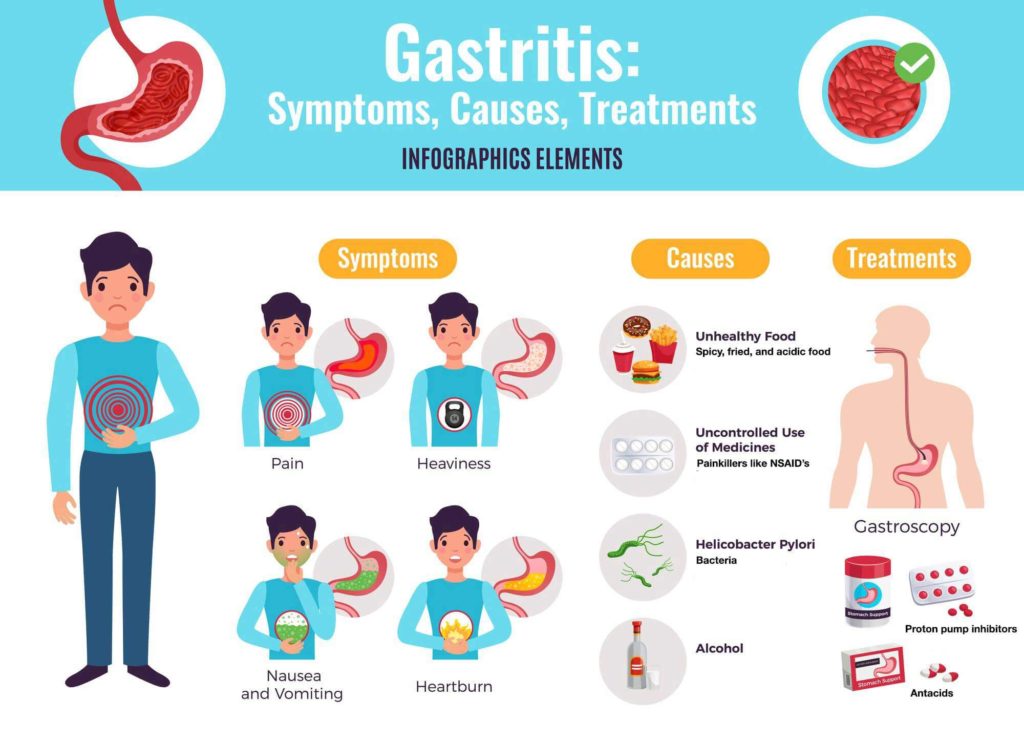
Health issues that can cause gastritis are:
- Infections caused by bacteria and viruses
- Major surgery
- Traumatic injury or burns
Some diseases can also cause gastritis. These include:
- Autoimmune disorders. This is when your immune system attacks your body’s healthy cells by mistake.
- Chronic bile reflux. This is when bile backs up into your stomach and food pipe (esophagus). Bile is a fluid that helps you digest food.
- Pernicious anemia. This is a form of anemia that happens when your stomach can’t digest vitamin B-12.
Types of Gastritis
There are mainly two types of gastritis – acute and chronic.
- Acute Gastritis – This type causes pain and swelling in the stomach and does not last for a long period or it goes away within few days.
- Chronic Gastritis – This refers to the condition lasting a longer period. Some may have chronic gastritis and not realize it because the signs are dull and not severe.
What are the symptoms of gastritis?
The symptoms of gastritis can be very misleading. Sometimes a very minor inflammation can cause severe symptoms and at the same time, severe inflammation may cause minor symptoms. Listed below are common gastritis symptoms
- A burning pain similar to indigestion in your upper abdomen. In some people, the pain gets better after eating; in others, it gets worse.
- Loss of appetite. This tends to go along with nausea, but many gastritis patients find they have no appetite even when they’re not feeling nauseated. After a couple of mouthfuls, they’re done.
- Belching or bloating. This can simply be gas, but if it’s chronic or severe, it could be caused by gastritis.
- Feeling particularly “full” in your upper abdomen after a meal.
- Unexplained weight loss. Of course, if you’re feeling nauseated and lacking in appetite, weight loss is to be expected.
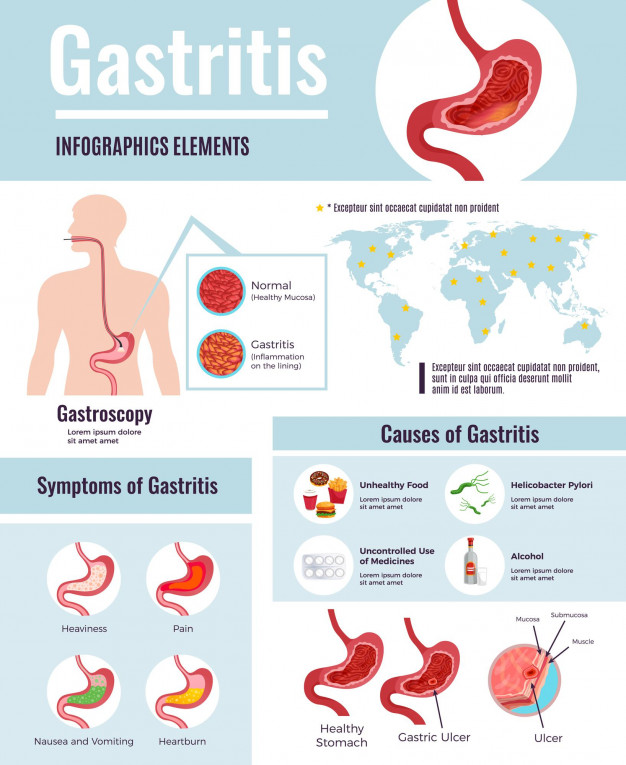
Note that all of these symptoms are mild on their own, and all can indicate many other ailments, too. What you think could be gastritis might turn out to be heartburn, for example. Stomach flu and stomach ulcers also share some symptoms with gastritis. That’s why it’s necessary to be tested by a doctor to determine whether your ailment truly is gastritis, or whether it’s something else altogether.
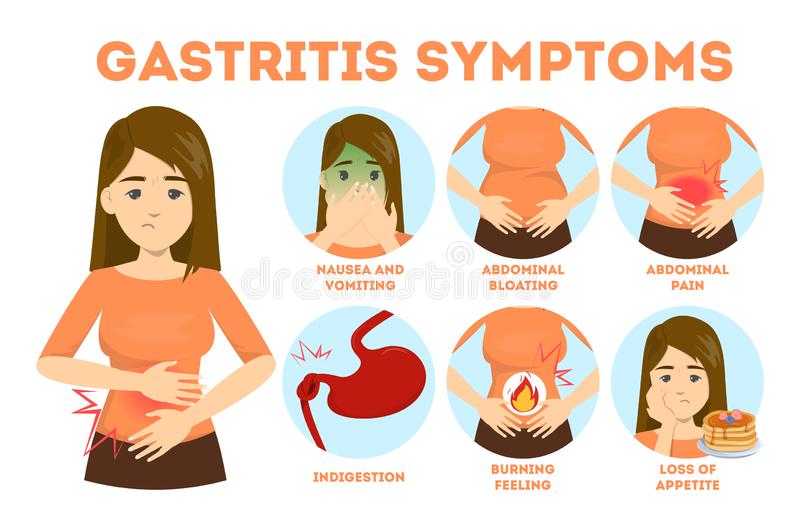
Some gastritis sufferers suffer additional symptoms brought about by stomach bleeding. Gastritis is rarely severe enough to cause stomach bleeding, but it happens occasionally if the stomach lining has been penetrated. A bleeding stomach can cause you to vomit blood or to have black, tarry stools. If you have either of these symptoms, you should see a doctor immediately.
Natural treatment for gastritis
Natural treatment is the way to go for effective treatment of gastritis without causing any side effects.
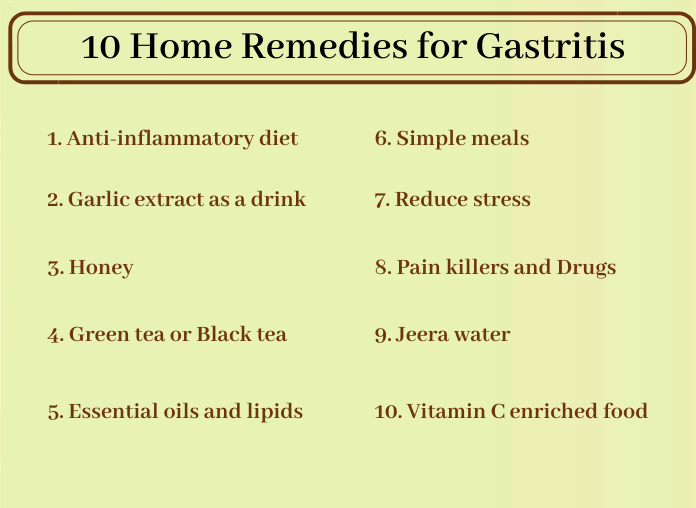
Listed below are different approaches to natural treatment for gastritis
Diet for gastritis – an essential part of any natural treatment for gastritis
Symptoms of gastritis may become worse if the food contains chemical irritants which cause or worsen the symptoms of gastritis and thus these irritants must be avoided. For example, stop smoking cigarettes, avoid drinking excessive amounts of alcohol, avoid caffeinated, decaffeinated, and carbonated drinks; and fruit juices containing citric acid, for example, grapefruit, orange, pineapple, etc., and avoid foods high in fat.
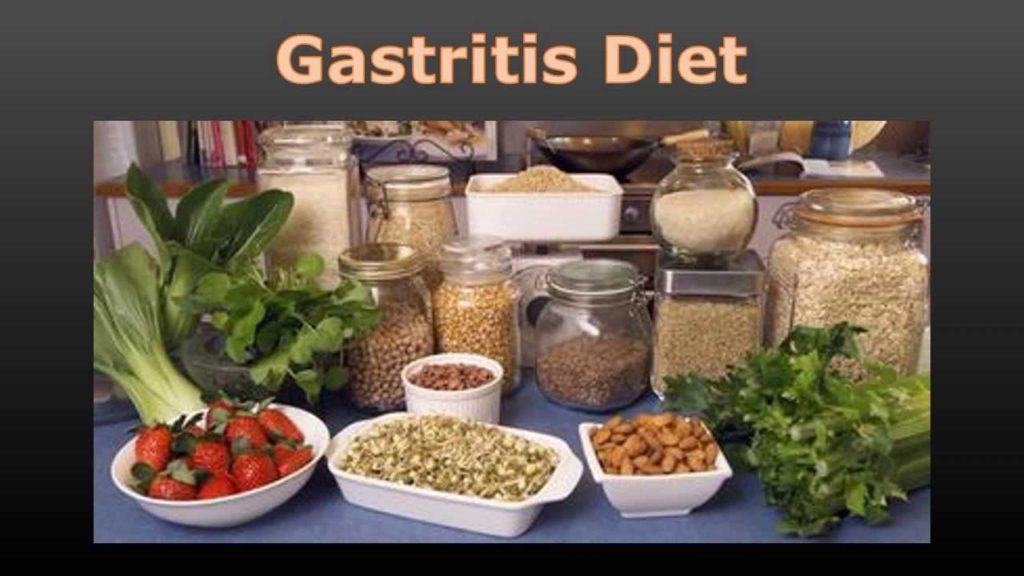
There is no gastritis diet, however, the growth of H. pylori can be stopped by a diet high in fiber and foods containing flavonoids, for example, certain teas, onions, garlic, berries, celery, kale, broccoli, parsley, thyme, foods containing soybeans and legumes, eg lentils, kidney beans, black beans, soybeans, pinto, and white beans.
Healthcare professionals at the University of Maryland and others suggest that eating smaller, more frequent meals and avoiding spicy, sour, fried, or fatty foods will help reduce symptoms. In addition, stress reduction is also recommended. Dietary changes such as ginger tea and/or chamomile tea with honey are said to relieve symptoms of gastritis, while onions, garlic, cranberries, apples, and celery may inhibit the growth of H. pylori.
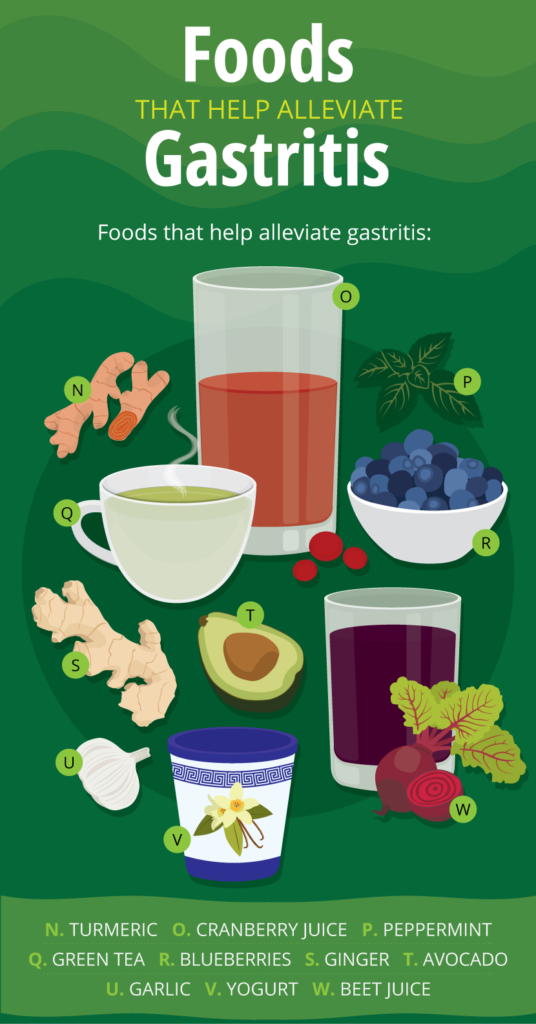
Foods that can stop the growth of H. pylori and relieve symptoms of gastritis include:
- Teas (especially green and white)
- Yogurt
- Peppermint
- Wheat bran
- Carrot juice
- Coconut water
- Green leafy vegetables
- Onions
- Garlic
- Apples
- Fresh fruits and berries
- Celery
- Cranberry juice
- Kale
- broccoli
- Shallots
- Parsley
- thyme
- Soy
- Soy products
- Legumes (beans, peas, and lentils)
While these home remedies can help reduce or ease symptoms, home remedies rarely treat the underlying causes of gastritis.
Home remedies for gastritis – the most common natural treatment for gastritis
Home remedies for gastritis aim at making sure that the inflammation level in the stomach gets reduced, and that the digestion process improves so that the stomach condition gets back to normal.
Listed below are home remedies for gastritis
- Spicy food needs to be avoided, this diet for gastritis needs to be avoided because it can lead to more burning sensations in the stomach and can add to the discomfort of the person. Those suffering from gastritis should consume light and less spicy foods, which are preferably bland so that the stomach can easily digest the foods.
- Coconut water is considered to be the most soothing and effective healer for people suffering from gastritis. It helps in treating the problem, and also reduces the inflammation in the stomach to make the person feel more comfortable. In addition to that, spinach juice and carrot juice should be consumed frequently when one is suffering from gastritis.
- Before meals, it is also good to take half a cup of potato juice. And it is also very important to ensure that the patient consumes a lot of water.
- Buttermilk and curd can also be consumed for added relief and quick recovery. Additionally, you can try the use of asafoetida and cumin water.
- Pickles, beverages such as tea and coffee, sweet aerated drinks, extremely sugary sweet diets, all kinds of strong spices and condiments, etc. all need to be avoided completely. These make the digestion process difficult and add to the discomfort of the patient. However, tamarind water can be consumed for relief.
Herbs for gastritis – popular and effective home-based natural treatment for gastritis
The use of herbs for gastritis is a form of natural treatment for gastritis that has also been proven for its effectiveness in the treatment of gastritis.
Listed below are herbs for gastritis:
Asparagus (Asparagus Racemosa)
- Asparagus is known to be an antispasmodic. It reduces the fire in the stomach. The root of the asparagus is effective in reducing the hyperacidity of the digestive system.
Bitter Chamomile (Matricaria chamomilla)
- The tea of the bitter chamomile is effective in allaying gastritis that is caused due to tensions and worries.
Cardamom (Elattaria cardamomum)
- Cardamom is an herb for gastritis that has soothing effects on the stomach. It is especially beneficial if gastritis causes heartburn.
Fennel (Fenneliculum Vulgare)
- Fennel is used as a digestive traditionally by Indians. After each meal, there is a tradition of chewing some seeds of fennel. Fennel soothes the stomach, facilitates digestion, reduces flatulence, and relieves the stomach of excess acidity.
Ginger (Zingiber officinale)
- The extract of ginger is effective in treating the acid dyspepsia that is associated with gastritis. It is especially useful for people who consume more non-vegetarian food.
Indian Gooseberry (Emblica Officinalis)
- The Indian gooseberry, or amla, is very beneficial in the treatment of several stomach ailments, gastritis included. The other digestive ailments it is used for dyspepsia, burning sensation, anorexia, vomiting, and hemorrhage.
Licorice (Glycyrrhiza glabra)
- The root of the licorice can soothe the inflammation and the injury to the stomach. It is also known to reduce the proliferation of Helicobacter pylori.
Rhubarb (Rheum emodi)
- Rhubarb is a mild agent; so it is effectively used in treating gastritis problems in children. It can reduce the acidity in the stomach.
Sandalwood (Santalum album)
- Sandalwood helps in gastritis because it has cooling properties. It can soothe the stomach muscles inflamed by gastritis.
Acupuncture for gastritis – traditional Chinese natural treatment for gastritis
In Traditional Chinese Medicine (TCM) gastritis is a symptom with many root causes, and because TCM treats those causes directly, it results in more effective treatment and rapid recovery.

Acupuncture for gastritis is a natural treatment for gastritis that helps boosts the immune system, which can help the body fight off infections and improve overall gut health. It has a calming and relaxing effect on the body to decrease stress and its effects. Acupuncture for gastritis also increases blood flow to and between the vital organs, breaking up toxins and blockages to decrease inflammation.
A research carried out revealed that Acupuncture for gastritis produces significantly more positive patient outcomes than the antihistamine Ranitidine, commonly prescribed for gastritis patients. Throughout 20 treatments, acupuncture produced a 96.4% total success rate where Ranitidine only had a success rate of 69.9%.
Homeopathic remedies for gastritis – #1 natural treatment for gastritis
Homeopathy for gastritis is based on the use of natural remedies for gastritis that help to reduce nausea, burning, belching, and symptoms associated with gastritis.
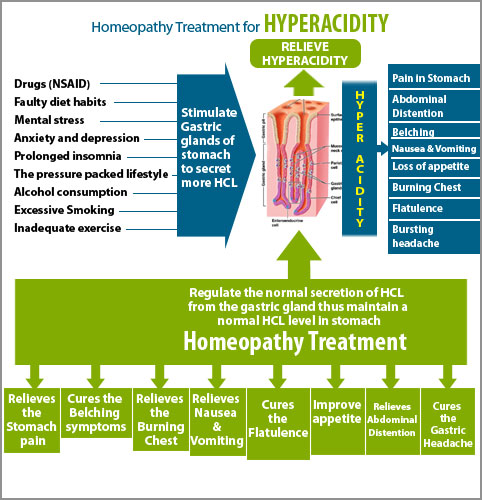
Homeopathy is considered to be the most ideal method for treating Gastritis. These natural remedies for gastritis not just control the symptoms but work deep inside and prevent the re-occurrence of the disease by treating the root causes successfully. Homeopathy for gastritis is strongly recommended as it is safe and does not lead to side effects and this is the most important and biggest advantage when compared to other conventional methods. Listed below are homeopathic remedies for gastritis:
- Ipecac-root is one of the best homeopathic remedies for gastritis that is primarily used for nerve irritations that cause spasms in the chest and stomach. It helps in the management of nausea and vomiting in case of acute gastritis.
Kalium Bichromicum has a special affinity to the inner lining of the stomach and intestine. Thus, it is mainly used in the treatment of acute and chronic gastric disturbances. This remedy can also be used in the management of:
- Stomach ulcers
- Inflammation of the stomach lining
- Vomit that appears like bright yellow
- Nux vomica is used for treating acute and chronic inflammatory conditions of the stomach, especially the ones caused by alcohol abuse.
- This homeopathic remedy for gastritis is mainly used in the treatment of acute gastritis but can also treat chronic gastritis and gastroenteritis, i.e., inflammation of the stomach and intestinal linings. It is also useful for other symptoms like severe pain in the abdomen, Flatulence Burning sensation in the abdomen.
Conclusion
Natural treatment for gastritis is effective, safe, and affordable. The use of natural herbal remedies, homeopathy, or acupuncture may surprise you with its successful results. However, it is important that medical professionals well-trained in naturopathic medicine supervise your treatment. For evaluation and treatment at the Philadelphia Homeopathic Clinic contact us at (215) 621-8485 and schedule an appointment with Dr. Tsan
Comments
Post a Comment